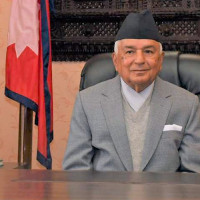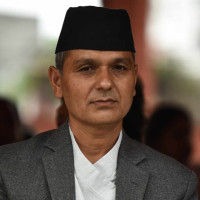- Thursday, 19 February 2026
Reframe Policy For Health Equity
Globally, health polices play a pivotal role in determining availability, accessibility, quality and equity of health care services. In many developing countries, health policies are largely guided by global as well as regional strategies to align with national as well as international commitments such as Universal Health Coverage (UHC) and Sustainable Development Goals (SDGs). In particular, Nepal’s health policy landscape is shaped by the core priorities of the 16th periodic plan (2024/25-2028/29).
Among many others, health is one of the critical sectors for reform in the federal context. Taking a closer look at recent polices and priorities for fiscal year (2025/2026), more coordinated and collaborative efforts are needed to make it a reality. Ensuring availability, accessibility and affordability of quality health care is still a pressing challenge for the government and other partners in health sector. This truly demands a strong political will and leadership to protect and promote people’s health rights.
Notable progress
Despite notable progress, there are still layered variations in terms of policy and practice. Political leaders and policy makers are often engaged in several high-level coordination meetings to explore innovative ideas and solutions for urgent priorities in health sector. However, there is always a central question: How are the policies and strategic priorities implemented to ensure equitable health services for all? In essence, the issue is not simply formulating ambitious policies and strategic priorities, but how these are strategically implemented to yield tangible results for improving health outcomes. There needs to be a sharp focus on critical review of existing policies to draw useful lessons for future.
Moreover, institutional analysis from an interdisciplinary approach is necessary to better understand the hidden realities of health facilities in terms of challenges and opportunities in the federal context. No doubt that health policy needs to realistically address socio-cultural and geographical diversity. The unequal distribution of resources have creeping impacts on delivery of basic health care services. The socio-political inequalities have been critical barriers in ensuring the UHC and reducing out-of-pocket expenditure. Most often, mainstreaming gender and social inclusion in health policies are overlooked during implementation, periodic review and evaluation.
Despite notable efforts of coordination and collaboration with a range of partners and other sectors, the progress is still minimal. The worrying scenario is that the ambitious policies and strategic areas often suffer from limited financial and human resources. External support from development partners is also shrinking. Moreover, it is likely that government’s budget allocation in health will not substantially increase further. Therefore, available resources from development partners must be appropriately harnessed to complement the resource needs for continuity and sustainability.
Additionally, local governments need adequate technical support from federal and provincial governments for effective implementation of national health plans and programmes. In some cases, there are still concerns of observable inefficiency in planning, implementation, monitoring and evaluation of health interventions. Low absorption of available financial resources and significant delay in implementation of annual health plans reveal slow progress in meeting the targets. Promoting a culture of systems thinking is crucial to identify transformative pathways for driving change and achieving results.
People’s intersecting perceptions and beliefs towards government-led policies are differently understood and interpreted. Therefore, a great deal of discussion is necessary to explore social and cultural embeddedness of health care polices and sustaining role of dominant political and economic systems. Obviously, there is little attention of political leaders, policy makers, and planners to explore how macro-level social, economic and political forces shape the culture of health care systems and the subsequent implications in terms of resource use and people’s health and social well-being.
Appreciating social, cultural and political domains of health, the central tenet of health policies is to provide overarching strategic guidance in ensuring the health care needs of those who are poor, socio-culturally and politically marginalised populations. In particular, migrants, sexual and gender minorities, disabled, ethnic and indigenous populations face several barriers in accessing health and other social services. Unfortunately, they are not fully mainstreamed in local health governance as they still lack effective representation, participation and meaningful engagement in local health polices and services.
The voices of the vulnerable groups are not sufficiently heard yet by political leaders, civil society and health service providers. Seen from the lenses of marginality, inclusivity and diversity, reframing health policy landscape must offer wider opportunities to promote people-centred as well as culturally appropriate narratives of health equity and social justice. Undoubtedly, this demands a sustained focus on concerns and voices of socially excluded populations that have remained underrepresented for years.
Revealing account
A revealing account of historical processes of health policy formulation perhaps gives some new thoughts about reframing policies in a changing political landscape. Political stability is both a necessary and desired condition for the effective implementation of health policy and strategic plan. Lack of political stability often causes frequent changes in leadership positions who have less time and attention to address the competing health priorities.
Health policy must address people’s hope for easy access to quality health care. In response to the unmet needs of health care of many poor and vulnerable populations, reframing health policy needs major emphasis on strengthening community and health systems at large. Moving forward, new strategic approaches to address global issues such as climate change, air pollution, pandemics, disasters, the increasing trend of non-communicable diseases and planetary health need to be locally contextualised and culturally constructed within the health domain and beyond.
Bhandari is a health policy analyst and has an interest in anthropology.
















